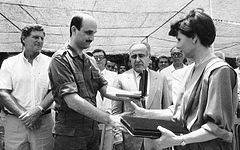Samir Geagea, Date of Birth, Place of Birth
TweetSamir Geagea
Lebanese politician and former warlordAbout Samir Geagea
- Samir Farid Geagea (Arabic: ???? ???? ????? Lebanese pron.: [sa'mi?? fa'?i?d '?a??a?], also spelled Samir Ja'ja'; born on 25 October 1952 in Ain al-Remaneh), from the town of Bsharri in northern Lebanon, is a Lebanese leader and politician.
- He is the former executive chairman of the Lebanese Forces, a Christian political party in Lebanon. On 12 March 1985, Samir Geagea, Elie Hobeika and Karim Pakradouni rebelled against Abou Nader's command, ostensibly to take the Lebanese Forces back to its original path.
- The relationship between Geagea and Hobeika soon broke down, however, and Hobeika began secret negotiations with the Syrians.
- On 28 December 1985, he signed the Tripartite Accord, against the wishes of Geagea and most of the other leading Christian figures.
- Claiming that the Tripartite Accord gave Syria unlimited power in Lebanon, Geagea mobilized factions inside the Lebanese Forces and on 15 January 1986, attacked Hobeika's headquarters in Karantina.
- Hobeika surrendered and fled, first to Paris and subsequently to Damascus, Syria.
- He then moved to Zahlé with tens of his fighters where he prepared for an attack against East Beirut.
- On 27 September 1986, Hobeika's forces tried to take over the Achrafieh neighborhood of Beirut but the Lebanese Forces of Geagea's command held them back. This failed attempt by Hobeika was the last episode of internal struggles in East Beirut during Amine Gemayel's mandate.
- As a result, the Lebanese Forces led by Geagea were the only major force on ground. After the departure of president Gemayel, two rival governments contended for recognition following Amine Gemayel's departure from the Presidency in September 1988, one a mainly Christian government and the other a government of Muslims and Lebanese Leftists.
- The Lebanese Forces initially supported the military Christian government led by Gen.
- Michel Aoun, the commander of the Lebanese Army.
- However, clashes erupted between the Lebanese Forces and the Lebanese Army under the control of Michel Aoun on 14 February 1989.
- These clashes were stopped, and after a meeting in Bkerké, the Lebanese Forces handed the national ports which it controlled to Aoun's government under pressure from the Lebanese National army. Geagea initially supported Aoun's "Liberation War" against the Syrian army, but then agreed to the Taif Agreement, which was signed by the Lebanese deputies on 24 October 1989 in Saudi Arabia and demanded an immediate ceasefire.
- Aoun's main objection to the Taif Agreement was its vagueness as to Syrian withdrawal from the country.
- He rejected it vowing that he "would not sign over the country." Fierce fighting in East Beirut broke out between the two, called the "Elimination War" on 31 January 1990. After the civil war, Geagea was offered insignificant political responsibilities.
- Which lead him to go into conflict with the Syrian sponsored regime. In 1994, four years after the end of the Lebanese Civil War, Geagea was tried for ordering four political assassinations, including the assassination of Lebanon's Prime Minister Rashid Karami in 1987, and the unsuccessful attempted assassination of Defense Minister Michel Murr in 1991.
- He denied all charges, but was found guilty and sentenced to four death sentences, each of which was commuted to life in prison.
- Geagea was imprisoned in solitary confinement below the Lebanese Ministry of Defense building in Beirut for the next 11 years.
- He is the only Lebanese militia leader to have been imprisoned for crimes committed during the Lebanese Civil War.Following the Cedar Revolution, and the subsequent withdrawal of Syrian forces from Lebanon, a newly elected Lebanese Parliament voted to grant him amnesty on 18 July 2005.
Read more at Wikipedia
See Also
- Famous People's Birthdays on 25 October, Lebanon
- Famous People's Birthdays in October, Lebanon
- Famous physician's Birthdays on 25 October, Lebanon
- Famous physician's Birthdays in October, Lebanon
- Famous military personnel's Birthdays on 25 October, Lebanon
- Famous military personnel's Birthdays in October, Lebanon
- Famous politician's Birthdays on 25 October, Lebanon
- Famous politician's Birthdays in October, Lebanon


 Date of Birth:
Date of Birth:  Place of Birth: Beirut, Beirut Governorate, Lebanon
Place of Birth: Beirut, Beirut Governorate, Lebanon